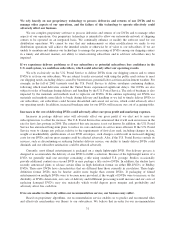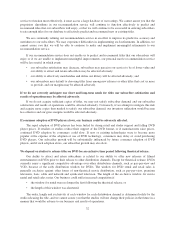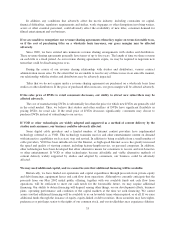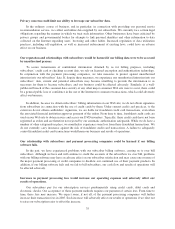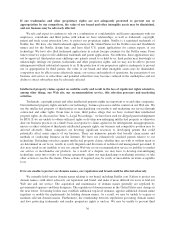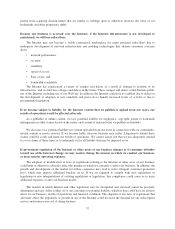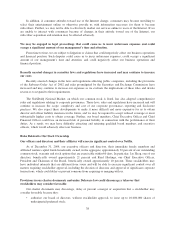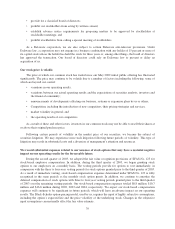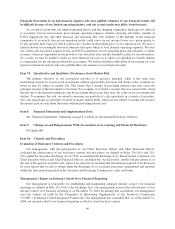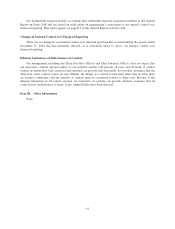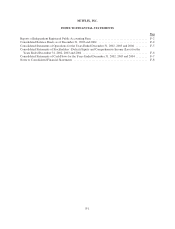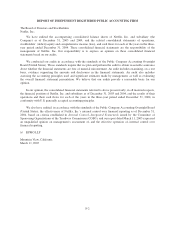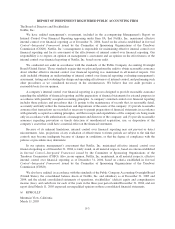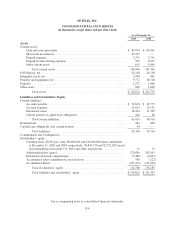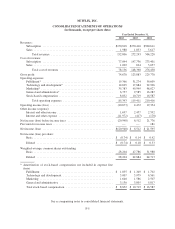NetFlix 2004 Annual Report Download - page 55
Download and view the complete annual report
Please find page 55 of the 2004 NetFlix annual report below. You can navigate through the pages in the report by either clicking on the pages listed below, or by using the keyword search tool below to find specific information within the annual report.• provide for a classified board of directors;
• prohibit our stockholders from acting by written consent;
• establish advance notice requirements for proposing matters to be approved by stockholders at
stockholder meetings; and
• prohibit stockholders from calling a special meeting of stockholders.
As a Delaware corporation, we are also subject to certain Delaware anti-takeover provisions. Under
Delaware law, a corporation may not engage in a business combination with any holder of 15 percent or more of
its capital stock unless the holder has held the stock for three years or, among other things, the board of directors
has approved the transaction. Our board of directors could rely on Delaware law to prevent or delay an
acquisition of us.
Our stock price is volatile.
The price at which our common stock has traded since our May 2002 initial public offering has fluctuated
significantly. The price may continue to be volatile due to a number of factors including the following, some of
which are beyond our control:
• variations in our operating results;
• variations between our actual operating results and the expectations of securities analysts, investors and
the financial community;
• announcements of developments affecting our business, systems or expansion plans by us or others;
• Competition, including the introduction of new competitors, their pricing strategies and services;
• market volatility in general; and
• the operating results of our competitors.
As a result of these and other factors, investors in our common stock may not be able to resell their shares at
or above their original purchase price.
Following certain periods of volatility in the market price of our securities, we became the subject of
securities litigation. We may experience more such litigation following future periods of volatility. This type of
litigation may result in substantial costs and a diversion of management’s attention and resources.
We record substantial expenses related to our issuance of stock options that may have a material negative
impact on our operating results for the foreseeable future.
During the second quarter of 2003, we adopted the fair value recognition provisions of SFAS No. 123 for
stock-based employee compensation. In addition, during the third quarter of 2003, we began granting stock
options to our employees on a monthly basis. The vesting periods provide for options to vest immediately, in
comparison with the three to four-year vesting periods for stock options granted prior to the third quarter of 2003.
As a result of immediate vesting, stock-based compensation expenses determined under SFAS No. 123 is fully
recognized in the same periods as the monthly stock option grants. In addition, we continue to amortize the
deferred compensation of stock options with three to four-year vesting periods granted prior to the third quarter
of 2003 over the remaining vesting periods. Our stock-based compensation expenses totaled $8.8 million, $10.7
million and $16.6 million during 2002, 2003 and 2004, respectively. We expect our stock-based compensation
expenses will continue to be significant in future periods, which will have an adverse impact on our operating
results. The Black-Scholes option-pricing model, used by us, requires the input of highly subjective assumptions,
including the option’s expected life and the price volatility of the underlying stock. Changes in the subjective
input assumptions can materially affect the fair value estimate.
39




